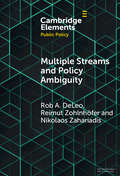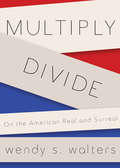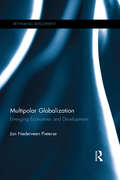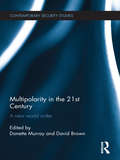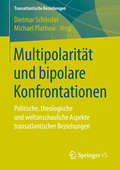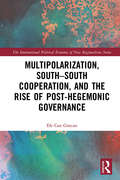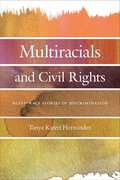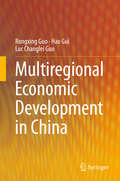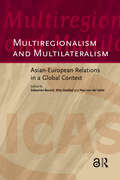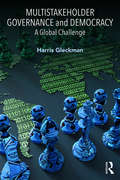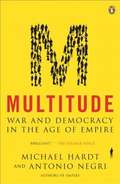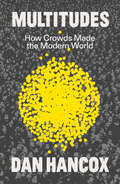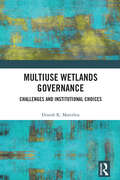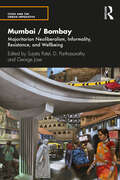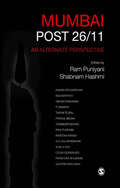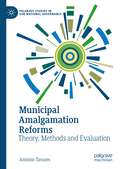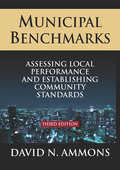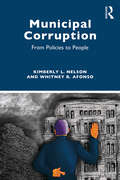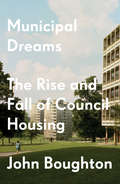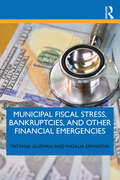- Table View
- List View
Multiple Streams and Policy Ambiguity (Elements in Public Policy)
by Rob A. DeLeo Reimut Zohlnhöfer Nikolaos ZahariadisThe last decade has seen a proliferation of research bolstering the theoretical and methodological rigor of the Multiple Streams Framework (MSF), one of the most prolific theories of agenda-setting and policy change. This Element sets out to address some of the most prominent criticisms of the theory, including the lack of empirical research and the inconsistent operationalization of key concepts, by developing the first comprehensive guide for conducting MSF research. It begins by introducing the MSF, including key theoretical constructs and hypotheses. It then presents the most important theoretical extensions of the framework and articulates a series of best practices for operationalizing, measuring, and analyzing MSF concepts. It closes by exploring existing gaps in MSF research and articulating fruitful areas of future research.
Multiple Übersetzung der Religion: Eine theoretisch-empirische Analyse zu Formen und Formaten alevitischer Religiosität (Veröffentlichungen der Sektion Religionssoziologie der Deutschen Gesellschaft für Soziologie)
by Elif YıldızlıDas Anliegen der vorliegenden Untersuchung ist es, mit der Theorie der multiplen Differenzierung einen soziologischen Blick auf Religion und die besonderen Übersetzungsverhältnisse am Beispiel der organisations- und milieuspezifischen Lage der Aleviten in der Türkei zu werfen. Dabei werden die spezifischen Anerkennungs-, Aushandlungs- und Transformationsprozesse der alevitischen Glaubensgemeinschaft betrachtet. Elif Yıldızlı arbeitet die Spannungen im Kontext von Religion in der modernen Gesellschaft und die Paradoxien zwischen verschiedenen (religiösen) Formen und der Funktion der sozialen Integration heraus. Dafür ist die Konzeptualisierung der Differenzierung u. a. zwischen (alevitischer) Organisation und (alevitischem) Milieu notwendig. Somit trägt diese Arbeit mit einer aufwendigen theoretisch-empirischen Analyse zur (religions-) soziologischen Erforschung verschiedener Integrationsformen der Aleviten bei als Beispiel für die Ausdifferenzierung einer neuen religiösen Milieutypologie.
Multiple-Choice and Free-Response Questions in Preparation for the AP United States Government and Politics Examination (Fifth Edition)
by Ethel WoodThis Fifth Edition assists students in assessing their level of understanding of both basic concepts and factual information in United States government and politics. The questions simulate as closely as possible the AP United States Government and Politics Examination administered each year in May by the College Board. The book prepares the students for both the multiple-choice and free-response portions of the AP Examination.
Multiply/Divide
by Wendy S. WaltersI have never been particularly interested in slavery, perhaps because it is such an obvious fact of my family's history. The fact that I am descended from slaves is hard to acknowledge on a day-to-day basis, because slavery does not fit with my self-image. Perhaps this is because I am pretty certain I would not have survived it.In the manner of Calvino's Invisible Cities, Wendy Walters deftly explores the psyches of cities such as Chicago, Detroit, Manhattan, and Portsmouth. In "Cleveland," she interviews an African-American playwright who draws great reviews, but can't muster an audience. An on-air telephone chat between a DJ and his listeners drives a discussion of race and nutrition in "Chicago Radio." In "Manhattanville" the author, out for a walk with her biracial son, is mistaken for his nanny. There's even a fable, imagining a black takeover of Norway. All of these essays explore societal questions--how eras of immense growth can leave us unable to prosper from that growth, how places intended for safety become fraught with danger, and how race and gender bias threaten our communities. As John D'Agata notes: "What probing, lively, ridiculously smart, gorgeously surprising essays."Wendy S. Walters is the author of two books of poems, Troy, Michigan and Longer I Wait, More You Love Me. Her work has appeared in Harper's, Bookforum, the Iowa Review, and many other publications. She is associate professor of creative writing at The New School University in New York.
Multipolar Globalization: Emerging Economies and Development (Rethinking Development)
by Jan Nederveen PieterseLike a giant oil tanker, the world is slowly turning. The rapid growth of economies in Asia and the global South has led to a momentous shift in the world order, leaving much of the traditional literature on globalization behind. Multipolar Globalization: Emerging Economies and Development is the perfect guide to these ongoing 21st-century transformations, combining engaging and wide-ranging coverage with cutting-edge analysis. The rise of China and other emerging economies has led to the emergence of a new geography of trade, new economic and political combinations, new financial actors, investors and donors, and weaker American hegemony. This interdisciplinary volume combines development studies, global political economy, sociology, and cultural studies to ask what this growth means for domestic and global inequality and examines the role of multipolarity in the reshaping of globalization. Renowned globalization scholar Jan Nederveen Pieterse deftly guides the reader through the development of globalization in the West and the East, explaining key topics such as the 2008 crash, trends in inequality, the changing fortunes of the BRICs, and the role of governance and democracy. Accessible and insightful, this book will be an essential guide for both students in the social sciences and for professionals and scholars seeking a fresh perspective.
Multipolarity in the 21st Century: A New World Order (Contemporary Security Studies)
by Donette Murray and David BrownThis book seeks to help shape the debate surrounding power and polarity in the twenty-first century, both by assessing the likelihood of US decline and by analysing what each of the so-called 'rising powers' can do. As the twenty-first century moves out of its first decade, American supremacy continues to generate intense debate about the nature, quality and sustainability of US power. At the same time, significant developments in four rising powers - China, Russia, India and the European Union – have provoked analysts to ask whether multipolarity is a realistic prospect. Multipolarity in the 21st Century assesses the likelihood of a multipolar world developing, either by a marked US decline and or by the ability of these putative ‘rivals’ to continue to rise to the level necessary to be credibly considered a superpower. Written by a combination of emerging scholars and recognised experts, this volume will provide a timely and authoritative analysis of one of the most controversial and compelling security debates of the twenty-first century. This book will be of much interest to students of Security Studies, Foreign Policy and International Relations in general.
Multipolarität und bipolare Konfrontationen
by Dietmar Schössler Michael PlathowDieser interdisziplinäre Sammelband vereint in zehn Beiträgen Analysen bi- und multipolarer Relationen, durch die potentielle Chancen, aber auch problematische Implikate vor Augen treten.Der Inhalt„Ironie“. Interpretationsmodell der Historie und ihre Bedeutung für Reinhold Niebuhrs politische Theologie heute ● Über Fremdheit und Selbstfremdheit der Kirchen im Kontext eskalierender Kulturkämpfe ● Politik der Differenz vs. Anerkennung im Zeichen radikaler Alterität ● Ernst Troeltsch und Max Weber – Religionstheorie in transatlantischer Perspektive ● ‚Neuer Atheismus‘ und ‚Kreationismus‘ – Transatlantische Zwillings-Phänomene ● Transatlantic Networks and the German-American Protestant Exchange ● Paul Tillichs Emigration in die Vereinigten Staaten und sein theologisches Reden über die Grenze ● Beobachtungen zum Weg von Leonardo Boff ● Sicherheitspolitischer Dialog zwischen transatlantischem Bündnis und dem Nahen Osten in Zeiten des geopolitischen UmstrukturierungsprozessesDie HerausgeberProf. Dr. em. Dietmar Schössler war Hochschullehrer für Politik- und Sozialwissenschaften an den Universitäten Mannheim, Frankfurt am Main und München (Universität der Bundeswehr).Prof. Dr. Michael Plathow ist Hochschullehrer für Systematische Theologie an der Universität Heidelberg.
Multipolarization, South-South Cooperation and the Rise of Post-Hegemonic Governance (The International Political Economy of New Regionalisms Series)
by Efe Can GürcanThe crisis of Northern capitalism and failure of hegemonic global governance have created a facilitative environment for post-hegemonic initiatives promoting South–South cooperation. Major Southern countries – especially the BRICS – have taken the lead in pushing for alternative governance mechanisms that are strongly articulated in the areas of economic, financial, cultural, and defense cooperation. This book focuses on the historical, political-economic, and geopolitical context in which major Southern countries implement a post-hegemonic agenda. Providing a global and comprehensive perspective through a series of focused case studies from Europe, Latin America, Eurasia, and Africa, the author develops a new approach to the multipolarization of world politics based on "global hegemony". Highly recommended for scholars, students, and activists involved in global political economy, regionalism studies, and international development, this book will be of interest to anyone seeking to develop their understanding of world politics and South–South cooperation.
Multiracials and Civil Rights: Mixed-Race Stories of Discrimination
by Tanya Katerí HernandezNarratives of mixed-race people bringing claims of racial discrimination in court, illuminating traditional understandings of civil rights law As the mixed-race population in the United States grows, public fascination with multiracial identity has promoted the belief that racial mixture will destroy racism. However, multiracial people still face discrimination. Many legal scholars hold that this is distinct from the discrimination faced by people of other races, and traditional civil rights laws built on a strict black/white binary need to be reformed to account for cases of discrimination against those identifying as mixed-race. In Multiracials and Civil Rights, Tanya Katerí Hernández debunks this idea, and draws on a plethora of court cases to demonstrate that multiracials face the same types of discrimination as other racial groups. Hernández argues that multiracial people are primarily targeted for discrimination due to their non-whiteness, and shows how the cases highlight the need to support the existing legal structures instead of a new understanding of civil rights law. The legal and political analysis is enriched with Hernández's own personal narrative as a mixed-race Afro-Latina. Coming at a time when explicit racism is resurfacing, Hernández’s look at multiracial discrimination cases is essential for fortifying the focus of civil rights law on racial privilege and the lingering legacy of bias against non-whites, and has much to teach us about how to move towards a more egalitarian society.
Multiregional Economic Development in China
by Rongxing Guo Luc Changlei Guo Hao GuiThis book provides, in an easy-to-use format, an extensive collection of data and information on China's 31 provinces and its interprovincial economic linkages. Intended as a comprehensive resource book, it profiles the geography, demography, and economy for each province. The materials presented, which are gathered from a variety of sources, including many not easily found in English-language media, will be of great value to students, researchers, business and government agencies, and news media professionals who are interested in either individual provinces or China as a whole.
Multiregionalism and Multilateralism: Asian-European Relations in a Global Context (ICAS Publications series)
by Benedikt SeemannThe Asia-Europe Meeting (ASEM, est. 1996) is an interregional forum which consists of the members of the European Union and the Association of Southeast Asian Nations and China, Japan and South Korea. The main components of the ASEM process include political dialogue, economy, education and culture. Multiregionalism and Multilateralism focuses on the institutionalsiation of intra-regional and inter-regional cooperation in the international system with emphasis on the changing relationship between the EU, China and India. The role of ASEM in this relationship is growing more important because of the growth of multilateralism as cornerstone of the international system.
Multistakeholder Governance and Democracy: A Global Challenge
by Harris GleckmanMultistakeholder governance is proposed as the way forward in global governance. For some leaders in civil society and government who are frustrated with the lack of power of the UN system and multilateralism it is seen as an attractive alternative; others, particularly in the corporate world, see multistakeholder governance as offering a more direct hand and potentially a legitimate role in national and global governance. This book examines how the development of multistakeholderism poses a challenge to multilateralism and democracy. Using a theoretical, historical perspective it describes how the debate on global governance evolved and what working principles of multilateralism are under threat. From a sociological perspective, the book identifies the organizational beliefs of multistakeholder groups and the likely change in the roles that leaders in government, civil society, and the private sector will face as they evolve into potential global governors. From a practical perspective, the book addresses the governance issues which organizations and individuals should assess before deciding to participate in or support a particular multistakeholder group. Given the current emphasis on the participation of multiple actors in the Sustainable Development Goals, this book will have wide appeal across policy-making and professional sectors involved in negotiations and governance at all levels. It will also be essential reading for students studying applied governance.
Multitude: War and Democracy in the Age of Empire
by Michael Hardt Antonio NegriIn their international bestseller Empire, Michael Hardt and Antonio Negri presented a grand unified vision of a world in which the old forms of imperialism are no longer effective. But what of Empire in an age of "American empire"? Has fear become our permanent condition and democracy an impossible dream? Such pessimism is profoundly mistaken, the authors argue. Empire, by interconnecting more areas of life, is actually creating the possibility for a new kind of democracy, allowing different groups to form a multitude, with the power to forge a democratic alternative to the present world order.Exhilarating in its optimism and depth of insight, Multitude consolidates Hardt and Negri's stature as two of the most important political philosophers at work in the world today.
Multitudes: How Crowds Made the Modern World
by Dan HancoxIn pursuit of the liberating powers of the crowdDespite what politicians, philosophers and the press have long told us, every peaceful crowd is not a violent mob in waiting. Dan Hancox argues it is time to rethink long-held assumptions about crowd behaviour and psychology, as well as the part crowds play in our lives. The story of the modern world is the story of multitudes in action. Crowds are the ultimate force for change: the bringer of conviviality, euphoria, mass culture and democracy.Behind the establishment&’s long war against crowds is the work of eccentric proto-fascist Gustave Le Bon. Having witnessed the revolutionary Paris Commune, he declared the crowd barbaric, the enemy of all that was civilized. In the twentieth century, his theory influenced Mussolini, Hitler and Freud alike. It moulded the policing of our communities and the new industry of public relations, shaping our cities and politics.From raucous football matches and raves to rubber-bullet-riddled riots, Dan Hancox takes us into the crowd&’s pulsating heart to pose the questions that will define our age. Is the madness of crowds real? What did the January 6 insurrection on Capitol Hill share with the Nuremberg rallies? What fresh dangers are posed to free assembly by the surveillance society? And how has a radical new generation of psychologists begun to change everything – even the policing of protests?
Multiuse Wetlands Governance: Challenges and Institutional Choices
by Dinesh K. MarothiaThe Ramsar Convention was established in 1971 to ensure the conservation and wise use of wetlands across the world. India joined the Convention in 1982, however, in the past 50 years despite Ramsar’s incredible achievements, the threat to wetlands across the globe, including India, has not diminished. This book studies the governance of multiuse wetlands in India. The volume provides an exhaustive analysis of rural, peri-urban and urban human-made wetlands to establish the relevance of institutional design and the effective role of authority in governing multiuse wetland ecosystem services. The author argues that the most challenging task in governing wetlands is to frame institutional choices that users and non-users comprehend, and agree to pursue under alternative property rights regimes. Drawing on extensive fieldwork, the book provides a broader look into the causes and consequences of wetland ecosystem degradation and offers insights into improved sustainable management systems for different types of multiuse wetlands. It will be indispensable for students and researchers of environmental studies, sustainable development, biodiversity, conservation, agricultural, natural, and environmental resource economics.
Mumbai / Bombay: Majoritarian Neoliberalism, Informality, Resistance, and Wellbeing (Cities and the Urban Imperative)
by Sujata Patel D. Parthasarathy George JoseMumbai/Bombay is a quintessential urban expression which represents the questions and puzzles related to Indian urbanity. This book traces the various ways through which majoritarianism and neoliberal capitalist accumulation has reorganised Bombay or Mumbai in India. The book assesses Mumbai’s present trajectories and processes as being embedded in its recent past. It looks at these changes by exploring work and labour; health and education; spatial planning and infrastructural development; politics and identity; and shows how financialisation, land speculation, deregulation and informality has impacted the city’s culture and everyday living. The contributors to this volume analyse the consequences of these changes for women and men across ages, as they live their material and cultural lives; evaluate the role of changing nature of work, urban infrastructure and planning; determine its outcome for public health and education; and take a measure of its manifestation in the field of arts and culture. The volume explores the processes that reorient these changes, the socio-spatial and political implications of these on the inhabitants of the city, and the resistance and response to marginalisation. This interdisciplinary volume will interest students and researchers of economics, sociology, anthropology, political science, public policy and urban studies. It will also be useful to urban practitioners, planners, bureaucrats, activists and general readers.
Mumbai: An Alternate Perspective
by Ram Puniyani Shabnam HashmiThis compilation analyzes the terror attacks on 26/11 in Mumbai from various angles, based on the understanding that deeper issues are hidden behind every such tragedy. It discusses terrorism, law, Indo-Pak relations, the indigenous causes of terrorism in India, the role of the state, the pattern of investigations so far, the prevalent laws, the response of civic society, the role of the media, the unsolved puzzles and the need for a deeper inquiry into the incident. Most of the chapters have been written in the immediate aftermath of the incident and bear the imprint of the pain and anguish it caused. With a focus on 26/11, the chapters discuss the entire phenomenon of terrorism. The broad contours of the analysis include the killing of non-combatants, the political motive or the statement behind such killings, and the secret planning of such attacks where the actors are even willing or keen to lay down their lives for bringing about such devastation. The book will be of great interest to the public at large and also to policy makers.
Mummy Told Me Not to Tell: The True Story of a Troubled Boy with a Dark Secret
by Cathy GlassReece is the last of six siblings to be fostered. Having been in care for four months his aggressive and disruptive behaviour has seen him passed from carer to carer. Although only 7, he has been excluded from school, and bites people so often that his mother calls him 'Sharky'. Cathy wants to find the answers for Reece's distressing behaviour, but he has been sworn to secrecy by his mother, and will not tell them anything. As the social worker prepares for the final hearing, he finds five different files on Reece's family, and is incredulous that he had not been removed from them as a baby. When the darkest of family secrets is revealed to Cathy, Reece's behaviour suddenly starts to make sense, and together they can begin to rebuild his life.
Mummy's Little Helper
by Casey WatsonThe fifth book from bestselling author and specialist foster carer Casey Watson. A recent census shows that there are at least 175,000 child carers in the UK, 13,000 of whom care for more than 50 hours a week. Many remain invisible to a system that would otherwise help them. Abigail is one of those children. This is her story. Ten-year-old Abigail has never known her father. Her mother, Sarah, has multiple sclerosis, and Abigail has been her carer since she was a toddler shopping, cooking, cleaning and attending to her personal needs. When Sarah is rushed to hospital, suddenly this comes to the attention of the social services, and Abigail has nowhere to go. Though she doesn't fit the usual profile of a child that specialist foster carers Casey and Mike Watson would take on, they are happy to step in and look after Abigail. It s an emergency, after all and all that s needed is a loving temporary home, while social services look into how to support the family so that they can be reunited. But it soon becomes clear that this isn't going to happen. Sarah s MS is now at a very advanced stage, and the doctors are certain that there will no longer be periods of remission. Abigail's emotional state starts to spiral out of control as she struggles to let go of the burden of responsibilities she has carried for so long. Sarah and Abigail insist that they do not need help, but with no other family to contact, social services are left with no choice but to find long-term care for Abigail, against their wishes. But Casey never gives up on a child in need, and she knows there must be another solution "
Munich: A novel
by Robert HarrisFrom the internationally best-selling author of Fatherland and the Cicero Trilogy--a new spy thriller about treason and conscience, loyalty and betrayal, set against the backdrop of the fateful Munich Conference of September 1938.Hugh Legat is a rising star of the British diplomatic service, serving at 10 Downing Street as a private secretary to the Prime Minister, Neville Chamberlain. Rikard von Holz is on the staff of the German Foreign Office--and secretly a member of the anti-Hitler resistance. The two men were friends at Oxford in the 1920s, but have not been in contact since. Now, when Hugh flies with Chamberlain from London to Munich, and Rikard travels on Hitler's train overnight from Berlin, their paths are set on a disastrous collision course. And once again, Robert Harris gives us actual events of historical importance--here are Hitler, Chamberlain, Mussolini, Daladier--at the heart of an electrifying, unputdownable novel.
Municipal Amalgamation Reforms: Theory, Methods and Evaluation (Palgrave Studies in Sub-National Governance)
by António TavaresThis book provides a comprehensive analysis of municipal amalgamation reforms in Europe. Adopting the analytical and methodological tools of comparative historical analysis, it examines how the history of local government systems has conditioned the adoption of municipal amalgamation reforms across time and space. Beginning with Sweden’s early amalgamation reforms during the late 1940s and early 1950s, it assesses how the evolution of the Welfare State, decentralization, urbanization, and economic growth have all impacted amalgamation reforms in ten other European countries. The book challenges the prevailing theory that amalgamations are implemented by rational design to improve the efficiency and capacity of local governments. Instead, it argues that state sovereignty, regime changes, centralization of authority and diffusion effects are more likely causes of the adoption of municipal amalgamation reforms. It will appeal to all those interested in public administration, public policy, European politics, and local governance studies.
Municipal Benchmarks: Assessing Local Performance and Establishing Community Standards
by David AmmonsCompletely updated with new listings and statistics throughout, this comprehensive resource goes beyond the current literature on local government performance measurement and provides benchmarks on more than 40 key topics against which performance can be assessed in all areas of operation. "Ammons has assembled a remarkable volume of benchmark data for a comprehensive range of municipal government services. Municipal Benchmarks will be of considerable help for municipalities in laying the groundwork for an accountable government." - Harry Hatry, The Urban Institute "I am delighted to see that ideas for advancing our industry are alive and thriving. Ammons's collection does an incredible service to every municipal manager in the country, and perhaps the world. These benchmarks clearly set standardized ways of looking at measuring the performance of municipal service delivery." - Ted Gaebler, City Manager, Rancho Cordoba, CA (co-author of Reinventing Government)
Municipal Corruption: From Policies to People
by Kimberly L. Nelson Whitney B. AfonsoThis book represents the most comprehensive exploration of corruption in U.S. municipal governments written to date.Exploring the 30-year time period from 1990 to 2020 and including all U.S. municipalities with populations of 10,000 people or more, Municipal Corruption: From Policies to People uses both quantitative research and case study analysis to answer the question of why some municipalities fall victim to corrupt acts, while others do not. It tells the stories of a number of communities that suffered through public corruption, investigating factors that contribute to a greater risk of corruption in municipalities, and identifying steps to prevent corruption in communities—including strengthening resident interest and involvement in local affairs, offsetting the decline in local journalism, and reinforcing scrutiny by state governments.Municipal Corruption is ideal supplemental reading for courses on ethics, public affairs, local government, and urban affairs, and it will be immeasurably useful to municipalities considering how to better insulate themselves and their constituents from corrupt acts.
Municipal Dreams: The Rise and Fall of Council Housing
by John BoughtonA narrative history of council housing—from slums to the Grenfell TowerUrgent, timely and compelling, Municipal Dreams brilliantly brings the national story of housing to life. In this landmark reappraisal of council housing, historian John Boughton presents an alternative history of Britain. Rooted in the ambition to end slum living, and the ideals of those who would build a new society, Municipal Dreams looks at how the state’s duty to house its people decently became central to our politics. The book makes it clear why that legacy and its promise should be defended. Traversing the nation in this comprehensive social, political and architectural history of council housing, Boughton offers a tour of some of the best and most remarkable of our housing estates—some happily ordinary, some judged notorious. He asks us to understand their complex story and to rethink our prejudices. His accounts include extraordinary planners and architects who wished to elevate working men and women through design; the competing ideologies that have promoted state housing and condemned it; the economic factors that have always constrained our housing ideals; the crisis wrought by Right to Buy; and the evolving controversies around regeneration. Boughton shows how losing the dream of good housing has weakened our community and hurt its most vulnerable—as was seen most catastrophically in the fire at Grenfell Tower.
Municipal Fiscal Stress, Bankruptcies, and Other Financial Emergencies
by Tatyana Guzman Natalia ErmasovaIt is difficult to find someone who has not heard about the Puerto Rico, Detroit, Michigan, or Orange County, California, bankruptcies. While guides for responsibly managing government finances exist, problems often originate not because of poor financial reporting or financial deficiencies but because issues external to financial wellbeing arise, such as economic, demographic, political, legal, or even environmental factors. Exacerbating the problem, there is not much advice in the existing literature on how to act when municipalities face financial struggles. Filling this important gap, this book explores fiscal health and fiscal hardships, municipal defaults and bankruptcies, and many other aspects to help guide local governments during fiscal distress. Fiscal hardships negatively affect the quality and availability of public goods and services and, consequently, the wellbeing of residents and businesses living and working in distressed municipalities. Turned off streetlights, unmaintained public parks, potholes, inconsistent garbage pickup, longer response time from emergency services, and multiple other issues that residents of the struggling municipalities deal with, lead to higher crime rates, lower quality of K-12 education, dangerous road conditions, lower housing values, outmigration of wealthier population, and numerous other problems. The COVID-19 pandemic put additional unprecedented pressure on municipal finances nationwide. In this book authors Tatyana Guzman and Natalia Ermasova evaluate distressed cities and municipalities and provide practical recommendations on improving their financial conditions. What are conditions and signs to look for to not to find yourself in similar situations? What can be done if your municipality is already experiencing fiscal hardships? What are the consequences of fiscal misfortunes? How does one exit a fiscal emergency? This book answers these and other questions and serves as a guide to fiscal health and prosperity for U.S. municipal governments, students and researchers in public finance, and general public management fields.
